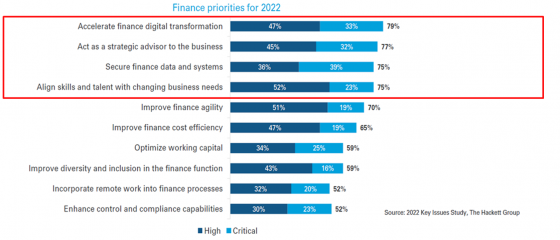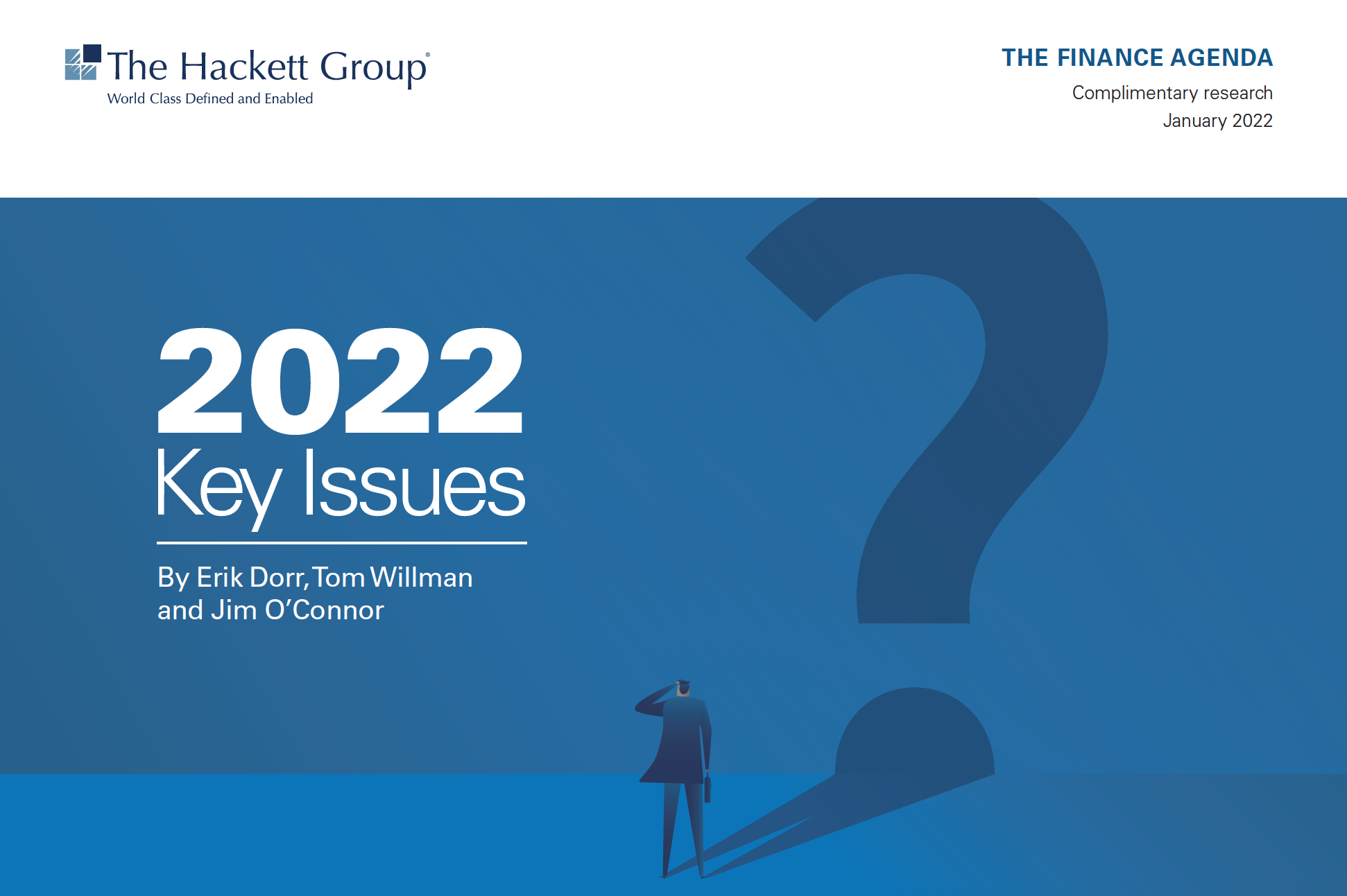
von Georg Bach, MD Central Europe, The Hackett Group
Das Krisenjahr 2022 stellt den Finance Bereich erneut vor große Herausforderungen.
Die Erwartungen der Finance-Führungskräfte an das Geschäftsjahr 2022 waren bereits bei Jahresbeginn mehr als ambivalent. Einerseits setzen sie auf digitales Wachstum und Erweiterung ihrer Geschäftsfelder, andererseits wird sich der außerordentlich hohe Aufwand im Risikomanagement fortsetzen. Und das betrifft nicht nur die Lieferketten. Zu den erwartbaren Finance Executive Themen 2022 gehören unter anderem der „War of Talent“, Cyber-Risk und die ansteigende Inflation. Externe Faktoren wie der künftige Pandemieverlauf und die aktuellen Kriegsereignisse in der Ukraine verstärken die bereits hohe Unsicherheit in den Märkten. Diese Ambivalenz belegt die aktuell von The Hackett Group vorgelegte Studie „2022 Key Issues: The Finance Agenda“, die über den Link http://go.poweredbyhackett.com/22finkey2201sm. kostenfrei bezogen werden kann.
Unsere Studie, die auf Aussagen von rund 250 internationalen Top Level Finance Führungskräften basiert, stellt in diesem Zusammenhang vier Aufgaben, die Finance Executives derzeit als Priorität sehen, in den Vordergrund.
Digitale Transformation beschleunigen
Die Beschleunigung der digitalen Transformation hat höchste Priorität. Schwerpunkte sind die Verbesserung der Analytik, der Darstellung und Modellierung der Geschäftsprozesse und des Reportings. Um den Wertbeitrag zu erhöhen, ist die Bereitschaft zu Investitionen in Schlüsseltechnologien wie Cloud oder AI zwingende Voraussetzung. Es besteht allerdings berechtigterweise Skepsis, ob die Herausforderungen angemessen erfüllt werden können. Hohe Technologie- und Prozesskomplexität, mangelnde Mitarbeiter-Skills und die oftmals fehlende Bereitschaft, Organisationsstrukturen nachhaltig zu ändern, machen den Führungsverantwortlichen zu schaffen.
Business Value im Fokus
Die Finanz-Organisationen planen zahlreiche Initiativen mit dem Ziel, die Wahrnehmung des Wertbeitrags sowohl intern als auch extern mit Zulieferern und Kunden zu stärken. Rund 60 Prozent der untersuchten Unternehmen haben für das laufende Geschäftsjahr Initiativen geplant, mit denen die Interaktion zwischen Finance und den Stakeholdern verbessert werden soll.

Abbildung: TOP Finance Agenda Priorities 2022, Quelle: The Hackett Group
Data Security and Systemschutz
Die zunehmenden, gezielten Hacker-Attacken stellen eine Bedrohung von Unternehmen dar, sei es durch Datendiebstahl, Schadsoftware, Erpressung oder Betrug. Disruptive Angriffe auf die Infrastruktur gehören mittlerweile zu den existentiellen Bedrohungsszenarien. Der Schutz von Daten und Infrastruktur gehört deshalb auch 2022 zu den Hauptaufgaben im Finance-Bereich. 75% der Führungskräfte stimmen dem zu.
Next Generation Workforce
Nicht überraschend ist es, dass die Finanz-Organisationen den Aufbau der „Next-Generation Workforce“ als ganz entscheidend bewerten: Die Förderung und Entwicklung neuer und umfassender Qualifikationen hat hohen Stellenwert. Die Führungskräfte schätzen für 2022 einen Zuwachs bei den Mitarbeitern in Schlüsselpositionen um fünf Prozent ̶̶ bei konstanten oder reduzierten Budgets. Es wird also generell erwartet, dass der Mitarbeiteraufbau für Schlüsselqualifikationen durch Optimierungen im Prozess- und Organisationsbereich kostenseitig neutralisiert werden kann.
Fazit der aktuellen Hackett-Studie: Der Einsatz von Technologie alleine schafft noch keine optimierte Entscheidungsfindung oder eine erhöhte „Market Responsiveness“. Um das zu sichern, müssen zuerst Daten- und Analytik-Qualifikationen gesteigert werden. Darüber hinaus sollte Finance eng mit HR kooperieren, um digitale Fähigkeiten und Talente zu rekrutieren, die künftig gebraucht werden. Grundsätzlich ist die Bereitschaft und Unterstützung von Unternehmensführung und „Key Stakeholdern“ ein wesentlicher Erfolgsfaktor, um die digitale Transformation erfolgreich zu exekutieren und damit den absehbaren Herausforderungen auch im Krisenjahr 2022 wirkungsvoll zu begegnen.
Die Studie können finden Sie auch auf der ICV-Website:
https://www.icv-controlling.com/de/verein/literatur/studien.html

by Georg Bach, MD Central Europe, The Hackett Group
The crisis year 2022 once again poses major challenges for the finance sector.
The expectations of finance executives for the 2022 financial year are and remain ambivalent. They rely on growth and expansion in the area of digitization and business areas, but they also know about the enormous effort involved in risk management with a view to supply chains, for example. Risks that are already foreseeable include the “war of talent”, cyber risks and increases in inflation. There are also external factors such as the course of the pandemic and war events such as those currently taking place in Ukraine. All of this further exacerbates the uncertainty in the markets. The ambivalences are shown in detail in the study “2022 Key Issues: The Finance Agenda that you can download it for free here on The Hackett Group’s external site http://go.poweredbyhackett.com/22finkey2201sm.
In this context, our study, which is based on statements by around 250 international top-level finance executives, focuses on four tasks that finance executives currently see as priorities.
Accelerating digital transformation
Accelerating digital transformation is a top priority. The focus is on improving analytics, the presentation and modeling of business processes and reporting. In order to increase the added value, the willingness to invest in key technologies such as cloud or AI is a mandatory requirement. However, there is legitimate skepticism as to whether the challenges can be adequately met. High technological and process complexity, a lack of employee skills and often unwillingness to change organizational structures in the long term create problems for those responsible for management.
Business Value in focus
The finance organizations are planning numerous initiatives with the aim of strengthening the perception of the value proposition both internally and externally with suppliers and customers. Around 60 percent of the companies surveyed have planned initiatives for the current financial year to improve the interaction between finance and stakeholders.

Picture: TOP Finance Agenda Priorities 2022, Source: The Hackett Group
Data Security and System Protection
The increasing number of targeted hacker attacks pose a threat to companies, whether through data theft, malware, blackmail or fraud. Disruptive attacks on the infrastructure are now among the existential threat scenarios. The protection of data and infrastructure will therefore also be one of the main tasks in the finance area in 2022. 75% of executives agree.
Next Generation Workforce
It is not surprising that the financial organizations rate the development of the “next-generation workforce” as crucial: the promotion and development of new and comprehensive qualifications is of great importance. For 2022, the executives estimate a five percent increase in the number of employees in key positions ̶̶ with constant or reduced budgets. It is therefore generally expected that the increase in staff for key qualifications can be neutralized on the cost side through optimizations in the process and organizational area.
Conclusion of the current Hackett study: The use of technology alone does not create optimized decision-making or increased “market responsiveness“. To ensure that, data and analytics skills must first be increased. In addition, Finance should work closely with HR to recruit digital skills and talent that will be needed in the future. Basically, the willingness and support of company management and “key stakeholders” is a key success factor in successfully executing the digital transformation and thus effectively meeting the foreseeable challenges even in the crisis year 2022.
You can also find the study on the ICV website:
https://www.icv-controlling.com/en/association/literature-and-top-topics/studies.html



